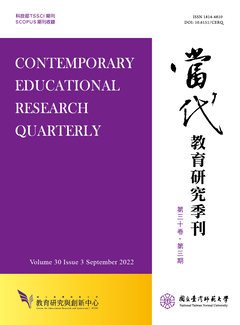

研究目的
本研究聚焦疫情對高教機構的影響,探討一所學校學務處防疫 經驗與歷程,從大學學務工作的角度切入,探討本次 COVID-19 疫 情對推展學務工作的困難與挑戰及因應策略與措施,並探究學務處 組織功能轉變、理念落實,及疫情對學務人員的角色與功能影響等 議題,展現創新防疫的積極作為與成果,具有提供高等教育機構參 考提升防疫措施與學務專業的價值。
研究設計/方法/取徑
本研究以個案研究法彙整分析學務人員執行防疫工作的經驗, 研究對象包含個案學校 5 位學務處中階主管及 7 位職員,其中中階 主管運用深度訪談法、職員則使用焦點團體法蒐集資料。此外並參照 31 次防疫會議紀錄進行交叉驗證,確立本研究信實度。研究發現或結論
本研究依據質性資料分析結果,歸納「覺知:展現學務人的敏 感度」、「實踐:凸顯學務工作的重要性」、「跨越:探索學務工 作的著力點」、「看見:找回學務人心中的價值」等四項主題,及 項下 22 個分析項目,透過學務人員展現對於疫情的敏感度及超前佈 署的覺知與行動,全面聚焦從學生輔導、活動調整以及社區關懷三 方面研擬方案;此外在政府主管機關及學務領導者引導下,確立校 園防疫著力點,學務人員亦發揮專業並提高科技使用度,規劃疫情 安心就學等具體措施,凸顯學務工作的重要性,同時更認同身為學 務人員的價值且以學生為中心、重視團隊合作以及超前部署的核心 理念。
研究原創性/價值
新冠肺炎(COVID-19)疫情影響全球,臺灣防疫措施受到國際 關注,為兼顧疫情控制與維持學習生活,規劃合宜的防疫措施是各 級學校 2020 年的重要挑戰。遺憾的是,個案學校於 3 月底、4 月初 共有兩名學生確診新冠肺炎,此意外的衝擊造成學校師生的恐慌以 及執行防疫工作的危機,同時考驗學務主管的行政作為與學務人員 的危機處理與反應能力。個案學校亦從狀況不明的情況下,透過經 驗的累積,發展嶄新學務工作處遇流程,校園防疫經驗值得與其他 高等教育機構分享與交流。本研究蒐集防疫期間站在第一線人員內 在經驗與實際作為,並透過質性分析建構學務人員在疫情衝擊中, 專業成長的轉化模式,具有研究創新的價值。
教育政策建議或實務意涵
針對研究分析結果,本研究提出對學務人員及校園防疫之建議, 包含學務人員應針對科技與網路社群經營能力提升專業,另在校園 防疫期間應針對學生需求規劃創新且彈性之學生服務與輔導方案,最後,建議學校進一步推動與社區的緊密連結、持續凝聚共識、建 立學校與社區友善關係,共同為臺灣社區防疫而努力。
Purpose
This research aims to explore a university’s experience and processes in epidemic preventions. This research looks into the effects of COVID-19 on higher education institutes-how the structure of the Office of Student Affairs changed, how ideas are implemented, and how the role of student affair personnel is affected. This research also displays the creativity and proactive measures along with epidemic prevention results in attempt to share with other higher education institutions in Taiwan the preventative measures and the value of Student Affairs.
Design/methodology/approach
Through the qualitative research of narrative inquiry, this research gathers the experiences of student affairs personnel in epidemic prevention through case study. Student affairs personnel include five managers that went through in-depth interviews and seven staffmembers that was put in focus groups. Other than that, thirty-one meeting minutes were used for cross examination to establish the validity of this research.
Findings/results
According to the qualitative analysis of the transcript, the results of this study are divided into the following four themes-Awareness: The Sensitivity of the Student Affair Personnel; Realization: The Importance of Student Affairs; Connection: The Search for a Focus;Vision: Redefining the Core Value of Student Affairs. Within the four themes there are also twenty-two items for analysis. With advancepreparation, the student affairs personnel have been sensitive in actively integrating different roles-focusing on student advising, activity rearrangement, and community care. Additionally, with the guidance of the government and student affairs professionals, the university was able to provide long-distance learning and other preventative measures with the help of technology. This increased thevalue of student affairs by confirming the core values of being studentcentered, embracing team work, and advance preparation.
Originality/value
With the COVID-19 epidemic affecting the world, Taiwan’sprecautionary measures against COVID-19 aroused much global attention. In order to control the spread of COVID-19 while maintaining student learning at the same time, taking appropriate precautions is key to all schools in 2020. Unfortunately, the university learned of two confirmed COVID-19 cases late March and early April. The news brought panic throughout the school and created epidemic prevention crisis for the university. As the university was able to implement new interventions, the gained experiences are worth sharing amongst other higher education institutes.
Implications for Policy/Practice
According to the research results, suggestions for student affairs personnel and campus epidemic prevention is provided-including the how student affairs personnel should increase literacy in technology and social media and professional ability. Finally, it is suggested that universities step forward to connect closely with the community. Creating consensus and building a friendly relationship between universities and communities enables teamwork to better Taiwan’s epidemic prevention.

This work is licensed under a Creative Commons Attribution-NonCommercial 3.0 Taiwan License.
Center for Educational Research and Innovation, National Tawain Normal University
162, Ho-Ping East Rd, Sec. 1, Taipei, Taiwan | Tel:+886-2-7749-3670 | E-mail: cerecerq@gmail.com
CERI | NTNU | E-mail Alerts | Open Journal System
© 2014 CERI-NTNU
